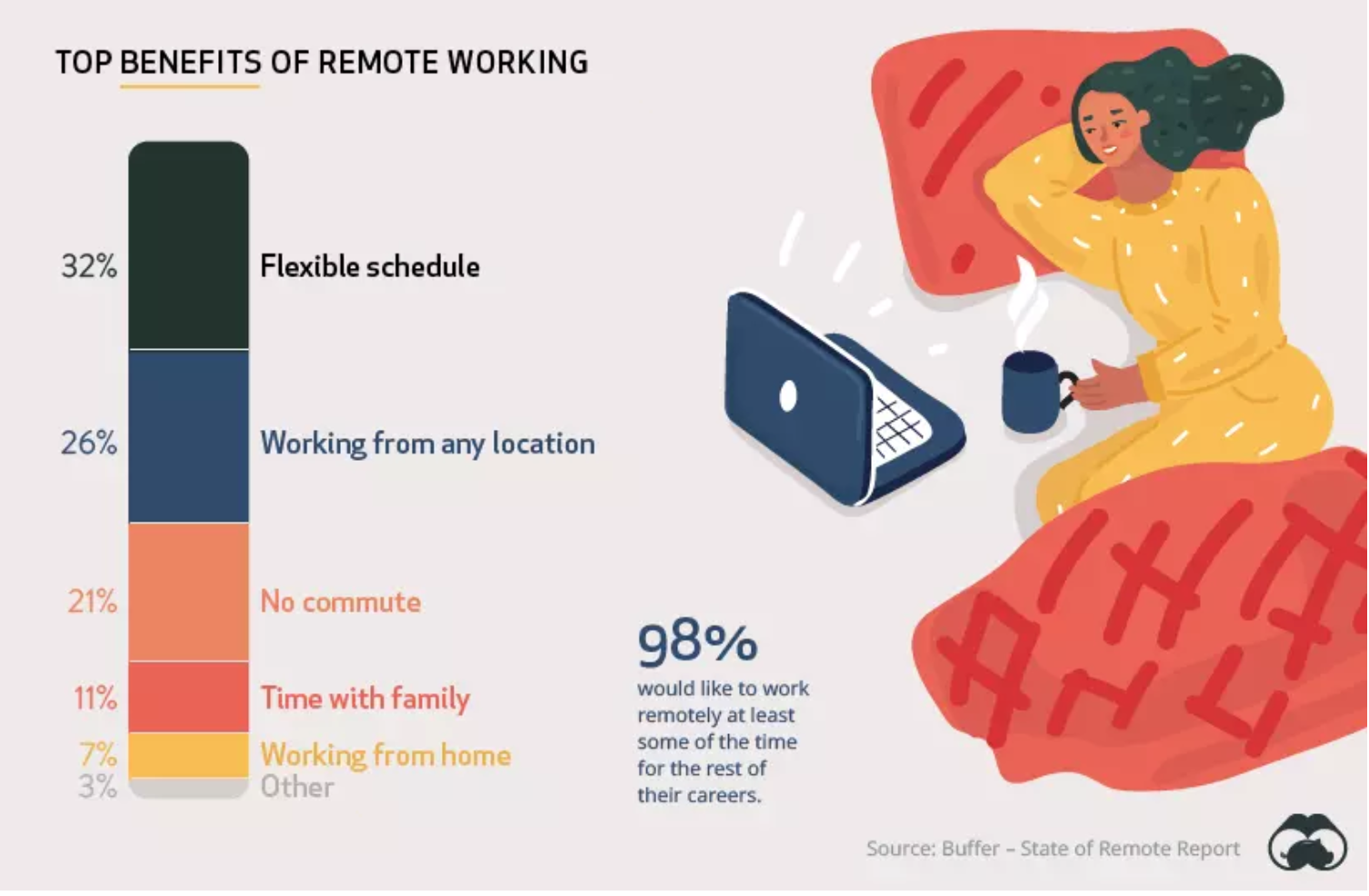Remote working is not quite the buzzword it was in the initial stages of the COVID-19 pandemic, and was met with significant resistance. Nevertheless, we are transitioning into a more normalized, long-term Work-From-Home (WFH) culture. According to Buffer from their ‘State of Remote’ report, it showed how a whopping 98% of individuals surveyed were for further remote working. Turns out, people like working from home. Some major advantages highlighted include less commuting, choice of location, and flexible schedules. Despite the hiccups and roadblocks, we have settled into our makeshift office spaces. Hopefully we’ve all obtained more ergonomic solutions in the meantime. And some motivation to keep going.

On closer inspection, The Netherlands has already had the unfair advantage in the WFH sphere. According to Eurostat, The Netherlands clocked in at 14.1% of employees working remotely in 2019, compared to the EU average at 5.4%. So while the world painfully transitioned, the Dutch, despite setbacks here and there, came out ahead of the game. A BBC article showcased that this more seamless shift may be due to the fact that The Netherlands has great infrastructure. Moreover, working facilities at home are taken care of, and there is an abundance of coworking spaces, libraries, and cafes.
Another important question is, who might be flourishing in this new dynamic, and why? How can we help those that need the extra support? Let’s dive into the different personality traits and ways to help those in an WFH setting.
The Personality Traits – The benefits and the downfalls
Introversion and Extroversion
Introversion is a trait in which individuals gain energy from within while extroversion is where the individual gains energy from the external world. This does not necessarily mean through social interaction. Rather, it can be the presence of others. Technically, extroversion may make WFH more of a challenge as it entails the need for socialisation to be productive throughout the day. Neverthless, both ends of the spectrum may feel the strain. Methods on overcoming loneliness, lack of belonging and disconnect may be to schedule a Zoom coffee break and coworking sessions with others – all possible remotely nowadays.
Curiosity
Curiosity as a personality trait is when one enjoys novel environments and the process of learning. They may be more apt when utilizing new tools and tech. Those with high curiosity tend to adapt better initially in a WFH setting, and may even prefer the flexibility it offers. On the other hand, they may tend to become more distracted, thus, it is important to ensure focus is maintained. More guidance from yourself through schedules or through superiors setting deadlines for objectives would be beneficial. Lower curiosity may mean more consistency and regular scheduling, task, and work as the mind stays focused. These individuals may benefit from a WFH setting which resembles the traditional setting of an office space they are accustomed to. Both work well together with the novel and the day-to-day necessities.
Adjustment and Adaptability
We have adaptability and adjustment, or the ability of one to acclimate to a new environment readily and easily. This also applies to the way we react to stressors and how we regulate our emotions in the face of adversity. Those who are highly adaptable face changes head-on and do not feel anxiety over the loss of control. On the other hand, they may be more aloof. It may be necessary to promote discussion when you feel colleagues are facing problems or experiencing challenges. Those with lower levels of this trait may find more enjoyment and relief from traditional working spheres as fewer stressors are present. Reassurance and clarity on projects may provide comfort in a WFH setting.
Conscientiousness
Conscientiousness, according to American Psychological Association, encompasses impulse control, delayed gratification, and goal-directed behavior. This includes an individual’s motivation and discipline for tasks over the long-term. Individuals who are more conscientious tend to be more organized and self-motivated. On the downside, it may be difficult to find a balance between keeping personal life and work separate. Those with lower conscientiousness tend to need more regular check-ins and plans for time-management. Arranging regular check-ins with superiors will promote better time-management strategies.
The Future
It is not certain whether remote working will continue after COVID-19 measures and vaccines are pushed through in the future but may be likely. Many work cultures worldwide revolve around the idea of ‘presenteeism’. This causes an unhealthy mindset when being away from the workspace. Around 1 in 5 Americans feel guilty when taking time off, according to the 2018 Work and Wellbeing Survey by the American Psychological Association. 73% of employees in the UK feel obligated to present themselves at work, regardless of their personal wellbeing, according to the Health and Well-Being at Work Survey Report commissioned by the Chartered Institute of Personnel and Development.
It is beneficial to look at personalities in a workspace to further discuss and highlight personality tendencies. This will help to understand the needs and expectations of yourself and others. Additionally, you can work with and alongside people’s strengths and weaknesses. Play your personality traits to your favor and try to find a way to thrive in your home environment!
If you are an expert, you can join the community with the link below:
Community: https://platform.knowco.net
Magazine: https://collabwith.co

